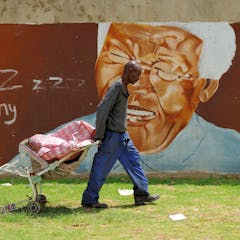
Articles on Crisis management
Displaying 1 - 20 of 44 articles

Woolworths promoted itself as a place where “goods are so cheap and shopping easy and pleasant” when it opened 100 years ago. Australia’s biggest grocer has moved away from its humble beginnings.

Embattled Optus chief Kelly Bayer Rosmarin who oversaw two network outages in the last year has resigned after admitting her company had no disaster management plan.

The Optus chief will face some tough questions about the company’s poor handling of last week’s catastrophic network outage when she appears before a Senate inquiry.

Almost half of all crises are disasters waiting to happen, because warnings have been unheeded or ignored.

Despite women now having equal representation within New Zealand’s parliament, the misogynistic abuse directed at Jacinda Ardern shows equal treatment of women in leadership is still a long way off.

New Zealand has ramped up biosecurity measures due to an Indonesian foot and mouth scare, but the disease can have huge impacts well beyond the agricultural economy.

Dealing with what have been called ‘wicked’ and ‘adaptive’ problems is a huge challenge for political leaders. A ‘clumsy’ response can be inevitable – and even desirable.

Canadian public health organizations have run into a serious communication problem about the AstraZeneca vaccine. Crisis management and communication theories explain what’s gone wrong.

Reading fiction can help business managers study sensitive workplace issues in an exploratory way, without the challenges of collecting employee data.

The coronavirus crisis has hit many businesses hard, but some have turned their difficulties into a springboard to move the company forward.

The centralised system that made NZ’s initial pandemic response so successful also explains the recent failures at the border.

When fighting a lethal foe on home soil, Lincoln expertly managed leading politicians; related well with the people; and dealt clearly with the military.

In the 1980s, CSIRO and its university collaborators set into motion a chain of events that would lead to the production of relenza, the first drug to successfully treat the flu.

As someone who researches and teaches leadership, I’d argue New Zealand Prime Minister Jacinda Ardern is giving most Western politicians a masterclass in crisis leadership.

China is seeking to present itself as a model in the fight against the coronavirus – even if it means rewriting the history of the crisis and discrediting the governance of liberal democracies.

COVID-19 has brought to the fore the interdependency of business and society. It’s time for amendments to the social contract that underlies societal support for business.

Crisis management and business continuity plans are powerful tools for companies to remain resilient and operational when unforeseen circumstances disrupt the availability of critical infrastructure.

Every business should go to great lengths to protect its personnel with a robust travel security program.

Social media make it easier to push information out quickly during disasters, but also create challenges for public information officers, who have to judge which reports are credible enough to share.

Do African decision-makers and leaders approach crises differently from counterparts elsewhere in the world?
